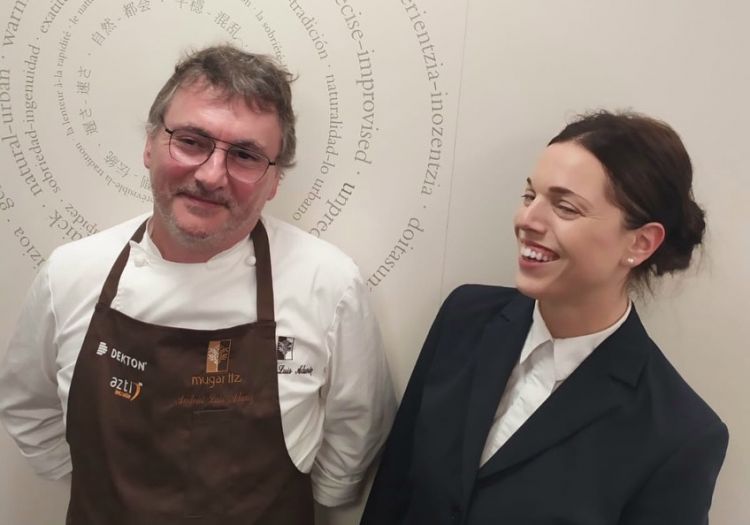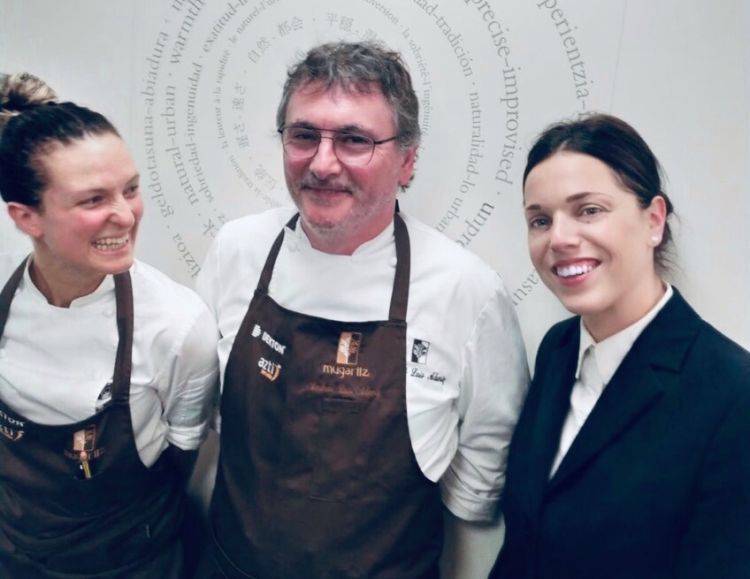I’m half Piedmontese and have Neapolitan. I was raised in Bra, in an extraordinary and large family. I started working in the dining room at 16, in the pizzeria next to home: I wanted to be independent and earn some money. This profession has always been a part of my life, from high school to university [she graduated in Socio-Cultural Education in Torino]. I used to consider it more of a hobby, a refuge where I could fully express myself, and take a break.
The experience in the pizzeria taught me the meaning of sacrifice, the duty of considering the team as a family, the importance of having fun and being satisfied with one’s job. After high school, I started working at Locanda Fontanazza in La Morra, 3 months after it opened. A magical place, with a magnificent view overlooking the village’s vineyards, and a dining room looked after in every detail by Mattia, a man who bets on simple raw materials, who creates magnificent connections with tradition and with local wine producers. We worked together, in complicity. I absorbed everything, like a sponge. After graduating, I enrolled in a course at Ais. Wine and vineyards gave me an incredible thrill. I realised that was my future.
In 2017 I got the urge to leave the country from my partner Roberto, a cook, who had always wanted to travel the world and was passionate about Mugaritz. He convinced me to follow him in San Sebastian, in the Basque Country. I immediately fell in love with the town. I started working at Amelia [the restaurant of Italian-Argentinian Paulo Airaudo, we wrote about him a few days ago]. In just a few months we got a Michelin star. A big emotion, a crucial moment in my career.
After lots of talking and waiting, I finally dined at Mugaritz. It was a constant surprise, and not necessarily in a positive way: I came across flavours that are difficult to recognise. Sometimes extraordinary, sometimes unpleasant. But they all share a common feature: they have something to say. A feature that urged me to want more and more, to take part in the project, without really realising what I was to face. Now that I’m maître at this restaurant, that wish has certainly not ceased. In fact, it grows stronger by the day.

Francesca in a portrait from Per-Anders Jörgensen, in the recent "Vanishing Points", a book that explores the creative process at Mugaritz

With partner and colleague at Mugaritz Roberto Garesio
Calling
Mugaritz “a restaurant” is not totally right. For me it’s like a school where you never stop learning, a theatre that creates unique emotions, concerts of food and liquid worlds. We don’t serve dishes, but moments. There’s often no cutlery, because we want to create a more intimate relationship with food. We want to build strong connections with textures and temperatures. There are no pairings, but
harmonies in which the liquid component is much more than a complement to the solid component, and vice versa.
It’s a place that demolishes every rule and protocol of traditional gastronomy. For instance, there is no dessert, by which I mean the end of the meal. And there are no starters or main courses. Dessert is interpreted as a flavour in between other flavours: it can play a more interesting role in other moments of the experience. Before being a restaurant,
Mugaritz is a way of thinking, a philosophy, a vision of the world.
And the dining room? The task of waiters and sommeliers is to guide clients on this journey: they must stimulate their questioning, their memories. Help them build their experience, which can go through fun moments, as well as unsettling and angry ones, and tears. Each time we can create 16 stories, one per each table in the dining room, all different from one another: it’s what I love most about this job.
After the first year as a waitress, they offered me a job as dining room manager which I share with
Tomás Ucha Altamirano,
Alex Escariz and
Eduardo Camiña Ucha, 3 exceptional sommeliers, all between 24 and 30 years old. For me it’s a great honour, as well as a responsibility because
Mugaritz is constantly evolving and so must we in the dining room. Not even when the restaurant is closed to the public, between January and April. It’s the so called “period of creativity”, when we experiment behind closed doors, when we define the details for the new season. A concentrated work of research, that later takes shape in the service, until the following December.

With Andoni Luis Aduriz, chef and founder at Mugaritz, in March 1998

With Andoni and Juliana Thorpe (left) Brazilian chef de partie
Those who work here must fully understand the philosophy of Mugaritz, all the cooking techniques, the ideas and concepts behind the creation of each dish. They must communicate the story of the wines, their producers and vineyards, and guide the client with no hesitation on a journey around the entire world.
To prepare the guys before the season begins, we organise a month of intensive training. In the 7 months when we’re open, there are always meetings and masterclasses with professionals from all over. This because we believe it’s essential that we never stop questioning ourselves, we never stop growing and stimulating and feed the passion of the new arrivals. Cleaning and maintaining the dining room, service rules, team organisation, attention to clients and to each element of the team: these are all essential aspects of my tasks, which are necessary to create a good feeling among the guys who participate in defining the excellence of Mugaritz.
There’s a motto that finely directs our actions: «The possible of the impossible is measured by the will of a human being». It’s a sentence that motivates us each day to go beyond our limits. Of course, there are huge efforts and sacrifices to be made to arrive and to stay here; but with will and passion you can overcome the first boundary, and surprise yourself each day.
Two years ago, at the beginning of this experience, I would have never dreamt of becoming maître of the seventh restaurant in the world so soon. I’m grateful and honoured. In the future, I’ll return to Italy, a country I love. But for now, “I think Mugaritz”, a philosophy that is part of me and that will be a part of me in every leg of the way.
See also
Sublime Mugaritz
Translated into English by Slawka G. Scarso